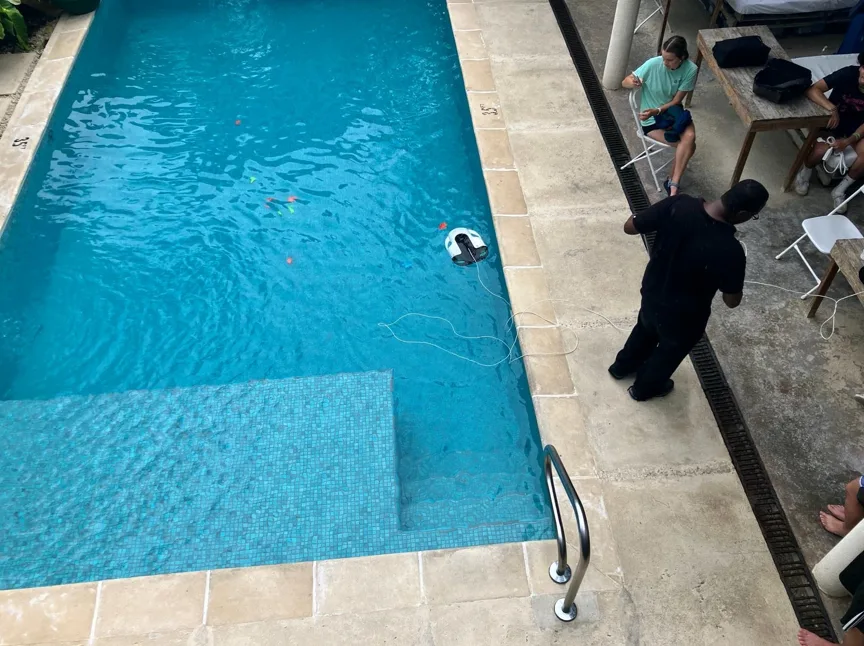Programs Blog
Blue Bot Project Barbados

November 18, 2024
Location: Paradise Point, Bridgetown, Barbados
Weather: The frogs love it
Hello SEA reader, it is I, Leandro Nuckols. On November 17th my cohort met with an environmental scientist named Antonio Hollingsworth, representing his company dubbed the Blue Bot Project Barbados. The time we spent with him was incredibly insightful. His work is centered around data collection on reefs, using AI technology to analyze community composition from video footage. The method by which this data is collected was super charismatic – a little remote-controlled, gurgling robot with some 4k cameras installed. We each got our own chances of driving the machine, while we talked about how his company grew, as well as further routes of development.
The data collected by the Blue Bot Project is incredibly important for conservation science, as it expedites the cataloguing of environmental change in the region. With science initiatives largely underfunded in the region, this change in the release speed of deliverables can become a standardized process to be followed around the world. Investment in projects like the Blue Bot Project will lead to real-time updates on the environmental status of tropical nations around the world, which in turn identifies key opportunities for improvement. In the spheres of policymaking and project management, this elucidation of pressing issues is almost entirely a net positive. As this genre of processes becomes more standardized, costs of data collection will diminish, reapportioning investment directly into rehabilitation and on-the-ground projects, which allows for quicker environmental benefit.
As data collection becomes less and less of a hassle, and the barriers to entry for data collection work decrease, community involvement in conservation will become much more ubiquitous. In fact, with projects like Blue Bot, it’s actually kinda fun. Data collection shifts from being a headache into a learning experience and source of entertainment. Antonio was talking to us about how the use of the Blue Bot offers an introduction to the ocean’s wonders without triggering the woes of thalassophobia. It provides opportunities for the reshaping of one’s relationship to the ocean, dispelling the fear of the unknown and letting curiosity take its place, all the while collecting valuable data.
I hope to witness the success of Antonio’s project, and for our debt to nature to be addressed. Maybe these two things will coalesce!
Recent Posts from the Ships
- Ocean Classroom 2024-A collaborative high school program with Proctor Academy
- Collaborations and Long-term Commitments: SEA’s Caribbean Reef Program Sets a Course for Coastal Programs that Compliment Shipboard Experiences.
- Sea Education Association students prepare for life underway using state of the art nautical simulation from Wartsila Corporation.
- SEA Writer 2022, Magazines From the Summer SEA Quest Students
- Technology@SEA: Upgrades Allow Insight into Ocean Depths
Programs
- Gap Year
- Ocean Exploration
- High School
- Science at SEA
- SEA Expedition
- SEAScape
- Pre-College
- Proctor Ocean Classroom
- Protecting the Phoenix Islands
- SPICE
- Stanford@SEA
- Undergraduate
- Climate and Society
- Climate Change and Coastal Resilience
- Coral Reef Conservation
- Marine Biodiversity and Conservation
- MBL
- Ocean Exploration: Plastics
- Ocean Policy: Marine Protected Areas
- Oceans and Climate
- Pacific Reef Expedition
- The Global Ocean: Hawai'i
- The Global Ocean: New Zealand